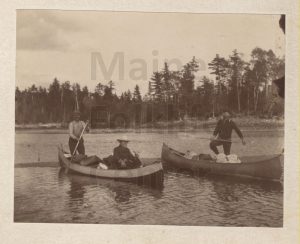Lille, “Youpe! Youpe! Sur La Riviere!”
Song: “Youpe! Youpe! Sur la Riviere!”
Singers: Mr. & Mrs. Lawrence Parent
Town: Lille, ME
ID: NA1479 CD 546 Track 1
Collected By: Steffan Duplessis
Date: 1980

A “home-made” song from Quebec, “Youpe!” came to Maine the same way many other songs traveled through Maine and the eastern Canadian provinces: with lumbermen who crossed the border in both directions. It was especially popular among French-Canadian loggers who adapted to their own use an earlier song called “Le p’tit bois d’lail.” It had an opening stanza identifying the hero as the captain of a regiment but it lacked the rollicking refrain found here. The song is not about life in the woods, rather it is a paddling song, a type of work song sung by men as they traveled by raft or canoe. Not unlike a sea shanty, paddling songs provided laborers both entertainment and a pace while they worked. According to Edith Fowke, in many ways, it is the most thoroughly Canadian: “Its hero is not a prince with a silver gun or a knight riding along a French road, but a habitant lad who goes to call on his girl and is rebuffed for being too fickle.” The version sung here contains lyrical alterations made by Mr. Parent. He did not change the story, but simply infused some personal details into the basic story. These changes are marked by brackets that contain Mr. Parent’s version of the song. See the notes following the English translation for more details on these alterations.
Lyrics:
1.
Par un dimanche au soir m’en allant promener
Et moi et puis [Octave] tous deux de compagnee,
Chez le bonhomm’ [Joe Cormier] – nous avons ‘te veiller,
Je vais vous raconter l’tour qui m’est arrive.
[Chorus]
Youpe! Youpe! Sur la riviere!
Vous ne m’entendez guere,
Youpe! Youpe! Sur la riviere!
Vous ne m’entendez pas.
2.
J’y allumai ma pipe comme c’etait la facon,
Disant quelques parol’s aux gens de la maison.
Je dis [la grosse Lucille]: “Me permettriez-vous
De m’eloigner des autr’s pour m’approcher de vous?”
[Chorus]
3.
“Ah! Oui, vraiment,” dit-elle, “avec un grand plaisir.
Tu es venu ce soir c’est seul’ment pour en rire;
Tu es trop infidele pour me parler d’amour:
T’as la p’tit’ Jeremie que tu aimes toujours.”
[Chorus]
4.
Revenons au bonhomme, qu’est dans son lit couche,
Criant a haute voix: “[Lucille], va te coucher!
Les gens de la [p’tite montagne], des vill’s et des faurbourgs,
Retirez-vous d’ici, car il fait bientot jour!”
[Chorus]
5.
J’ n’attends pas qu’on me l’dise pour la [deuxieme],
Et je dis a [Octave]: “T’en viens-tu quand et moi?
Bonsoir, ma [gross poutine], je file mon chemin!”
Je m’en allays nu-tete, mon chapeau a la main.
[Chorus]
Translation:
1.
’Twas on a Sunday night I went to take the air,
Myself and then [Octave] we were a friendly pair.
We made a midnight call on [Joe Cormier] that good man,
And now I’ll tell you all the things that happened then.
[Chorus]
Youpe! Youpe! River along!
Hearing me faintly far off.
Youpe! Youpe! River along!
Hearing me faintly afar.
2.
I lighted up my pipe, just as I always do,
And passed the time of day to all the folks I knew.
I said to [fat Lucille], “Oh will you be so kind,
To step aside and hear what I have on my mind?.”
[Chorus]
3.
“Ah, yes, indeed!” she said, “delighted I shall be,
You come this evening to make a fool of me.
But you’re too fickle far to speak to me of love,
You have your Jeremie, you call your little dove.”
[Chorus]
4.
Meanwhile the old man there is lying in his bed,
And crying out aloud, “[Lucille] be off to bed!
Now all you country folk, or city folk, I say
Good night! Be gone from here! For it will soon be day!”
[Chorus]
5.
I did not wait until he spoke a second time,
And I said to [Octave], “Let’s seek another clime.
Good evening, [my big fat dumpling], the road is looking grand!”
Bareheaded I went off, my hat within my hand.
Notes on the lyrics: Octave was an actual friend of Mr. Parent and he is substituted here for the character of Francois. The pair visits the house of Joe Cormier, Mr. Parent’s father-in-law, who replaces a man named Gauthier from the printed version. At the house Mrs. Parent, or Lucille (described as large or fat in verses two and five), replaces the fictional character Delima. The only other major change in the song is the use of Mr. Parent’s home in the fourth verse: “la p’tite montagne” was the area in the valley where he was from. The final change is only the substitution of one phrase meaning “second time” for another in the final verse.
Sources: Fowke, Edith, and Richard Johnston, eds. Folk Songs of Canada. Waterloo, Ontario: Waterloo Music Company, 1954, 62-64; & Mills, Alan, ed. Favorite French Folk Songs. Guitar accompaniments by Jerry Silverman. New York: Oak Publications, 1963, 66-67. Translation from Gibbon, J. Murray, ed. Canadian Folk Songs: Old and New. New York: E.P. Dutton, 1927, 86-89.
